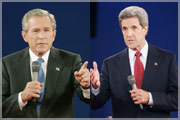
George W. Bush
US President George W. Bush is leading his rival John Kerry in various polls
just days before the first and pivotal presidential debate on Thursday, but a
second term in the White House is never guaranteed.
Bush's father lost his re-election bid in 1992 despite a post-1991 Gulf War
approval rating above 90 percent. Bush says he has learned a great deal from his
father's presidency and campaign and is determined to win a second term.
After receiving a Bachelor's degree at Yale University in 1968,Bush served in
the Texas Air National Guard for five years while tens of thousands of people of
his age, Kerry included, fought in Vietnam.
His service in the National Guard came to the forefront during the 2000
campaign and back again during this campaign. Critics accused him of favoritism,
saying his father had pulled strings to help him shun the military duty in
Vietnam.
But polls showed that voters this time say they would focus more on his
performance at the White House than his experience more than 30 years ago.
After the guard service, Bush received an MBA from Harvard Business School in
1975. After graduating, he returned to Texas and began a career in the energy
business. With a group of other investors he purchased the Texas Rangers
baseball franchise in 1989 and served as general managing partner.
Bush started his first bid for office in 1978, but lost to the incumbent in a
congressional race. In 1994, he returned to politics and was elected governor of
Texas, a position he held for six years.
After a bitter battle of vote recounting in Florida which last more than one
month, Bush was sent to the White House in the 2000 election by a 5-4 Supreme
Court decision.
In the first months of office, Bush stunned the world by carrying on a series
of unilateral policies. Washington refused to ratify or even withdrew from
international treaties on issues such as nuclear test ban, biological weapons
control, missile defense, global warming and the International Criminal Court.
The Sept. 11, 2001, terrorist attacks boosted Bush's approval rating and
offered him a golden opportunity to cast himself as a strong leader and firm
commander-in-chief. Bush launched a military strike in Afghanistan soon after
the Sept. 11 attacks. In March 2003, he ordered a US-led invasion of Iraq
despite the lack of international and UN support.
Realizing that he does not have advantage on domestic issues such as social
security, health care and economy, Bush has successfully made Iraq and terrorism
the center issues of this campaign. Polls have consistently showed voters giving
Bush higher points over Kerry on Iraq and terrorism.
But as US casualties continue to soar in Iraq and the cost of the rebuilding
continues to escalate, Bush will have to explain in the debate how the situation
in Iraq will turn better only by staying the course.
Bush and first lady Laura have twin daughters.
John Kerry
Various polls showed Senator John Kerry was lagging behind
President George W. Bush before the first face-to-face presidential debate
Thursday, which will be pivotal for the White House race.
But the Massachusetts senator, 60, is well known for seizing the
last moment to win a come-from-behind victory. He won at least three such
victories.
After graduating in 1966 from Yale University with a bachelor of
arts degree, Kerry joined the US Navy and served in Vietnam from 1968-1969. He
became a hero after winning a Silver Star, Bronze Star and three Purple hearts
as a swift boat officer.
Returning from Vietnam, the war hero turned to an anti-war
hero.Kerry made a name for his famous line when testifying before a Senate
committee: "How do you ask a man to be the last man to die for a mistake?"
Kerry's first foray into politics was not successful. In 1972,
28-year-old Kerry declared his candidacy in the 5th Congressional District in
Massachusetts but lost the bid.
After the defeat, Kerry went to Boston College and got a law
degree in 1976. He worked as an assistant district attorney and opened his own
law practice. But he never gave up his political ambition.
In 1982, Kerry was elected Lieutenant Governor of Massachusetts.In
1984, he was elected to the US Senate, where he is currently serving his fourth
consecutive term.
In these two elections, Kerry upset a favored Democratic rival for
the party's nomination.
In the days leading up to the first caucuses in this year's
primary season, Kerry was considered by many to be dead in the water. But Kerry
won a landslide and never looked back.
Before Kerry's first face-to-face encounter with Bush, polls show
voters giving him an edge on a number of domestic issues like social security,
health care and the economy. But he will have to use the debates to convince
Americans he is a strong leader and firm commander-in-chief.
The Republicans and the Bush campaign have portrayed Kerry as a
flip-flopper who keeps shifting positions on key national security issues such
as Iraqi war and terrorism. This campaign proved to have effectively damaged
Kerry's image and eroded his support.
Kerry is married to Teresa Heinz Kerry and has two daughters by a
previous marriage. Teresa Heinz is the widow of late Republican Senator John
Heinz of Pennsylvania and has an estimated fortune of 600 million US
dollars.



